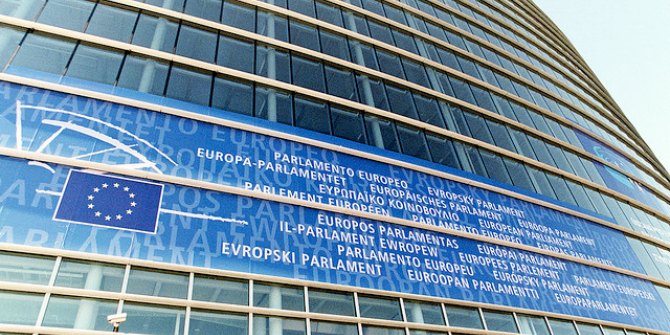What is Britain’s future in Europe? What future should Britain want for the EU? Roger Liddle‘s book provides valuable commentary on a topic that is highly salient in Britain and could radically change the trajectory of the country on multiple levels, writes Amani El Sehrawey.
This review was originally published on the LSE Review of Books.

With Britain poised for an election next year, the ever-present question of Europe and Cameron’s promise of a referendum looms large. In his book, The Europe Dilemma: Britain and the Drama of EU Integration, Roger Liddle delves beyond the rhetoric to explore the origins and history of Britain’s tumultuous relationship with the EU, and proposes solutions for a Britain within Europe.
Having spent 10 years as a political advisor on Europe, predominantly in Tony Blair’s No. 10, Liddle offers a unique blend of historical explanation and personal insight. Unsurprisingly, Liddle focuses most of his attention on the shift of Old Labour to New Labour and the Blair Government. He writes about the political developments of the time in a way that easily educates the uninitiated, while his personal anecdotes and analysis of the policy as it developed will be of interest to academics and policy-makers.
Liddle explores the complexities of the domestic party politics that often dictate European policy. He describes how Blair saw the EU as a fundamentally political project, not just a free trade area, and notably, how he advocated for Britain to adopt the euro (p.71). Liddle describes Blair’s policy towards Europe as mired by complex domestic political relationships, particularly with his Chancellor Gordon Brown, who was competing for leadership of the party and opposed to joining the euro.
The idea of a referendum on Europe – central to the debate today – came in the form of a referendum on the European constitution during the Blair Government. Liddle describes Blair’s eventual decision to give in and support the proposal for a constitutional referendum as an unfortunate ploy for political survival. This European decision made solely for domestic reasons, Liddle suggests, had dramatic consequences for Europe, as it influenced Chirac to hold France’s infamous referendum (p.150). Liddle also argues that Brown’s later rejection of the euro for Britain lay more in domestic politics and his desire to be new leader of the Labour party than in sound economic reasoning (p.159). Blair’s inability to bring Britain into the euro is seen by Liddle as one of his greatest failures.
Although the bulk of this work focuses heavily on the Blair Government, Liddle does turn to the Coalition Government to assess the current state of affairs. Liddle is less intimate with this Government, however he is able to offer insightful analysis on the domestic political drivers behind Britain’s European policy under Cameron. The eurocrisis gave euroscepticism in Britain a massive boost, and ultimately, Cameron chose not to be a particularly active partner in the European recovery (p.209). Britain’s continental relationship further deteriorated in 2011 when Cameron vetoed the fiscal compact. It later passed as an intergovernmental agreement without Britain, creating a European-level fiscal policy which the UK was affected by without being able to affect (p.209). Liddle speculates that Cameron did this to avoid fueling the eurosceptic fire in the House of Commons for an in-out referendum; Cameron argued publicly about preserving British national interests (p.210). Britain also rejected inclusion in a European banking union. These European reforms, among others, were marked by eurosceptics as significant enough integration to prompt an in-out referendum, and led to the Conservative backbench rebellion (p.215). The rise of UKIP further jeopardized Cameron and his party, and the need to move forward with a referendum on Europe. Liddle sympathizes that, much like Blair, Cameron was backed into the referendum, and now finds himself in the difficult position of having to win an “in” vote, amid party opposition. Liddle points that a “yes” vote could be a watershed moment for the Conservative party – representing a party split akin to only several in party history.

Finally, Liddle proposes his own solutions for Britain: a deepening of the single market; tougher financial regulation; harmonized corporate tax base; policy to address regional inequalities; the continued free movement of labour, with added safeguards against employee exploitation; and an EU carbon tax. Several of these policy proposals are contentious both on the British and European level. Taxation harmonization is sensitive and would garner a high level of pushback from several Member States, and the logistics of such fiscal policy integration is a difficult one. Continued free movement of labour will certainly also be unpopular with a British public that seem obsessed by immigration.
Liddle offers further proposals, including the creation of a British Secretary of State for Europe, who would liaise between Brussels and Westminster, in addition to the mix of the Prime Minister, Foreign Secretary, and Chancellor. Second, he suggests a committee to review existing EU law that lies with national parliaments. A new committee initiating legislative reform would significantly alter the existing decision-making process within the EU, a suggestion which would likely meet strong resistance in Brussels. Third, he proposes the need to reconnect the spheres of national governance and European governance. In order to do this, he suggests the creation of a second chamber comprised of senior parliamentarians from Member States. The need to create more connective tissue between Member State and EU is well placed, although how a second chamber of Member State parliamentarians would be received in Brussels and in the Member States is unknown. Finally, and most controversially, Liddle suggests the creation of a directly elected single EU president and the entry of the UK into a “Mark Two” Euro. Such a restructuring, particularly with Liddle’s role for an EU president necessitating a vastly smaller and restricted Commission, seems foreseeably unlikely. However, with an increasing desire for democratic accountability in the EU, perhaps this will become a reality in the future. In regard to the Euro, the fallout from the Eurozone crisis makes joining the Euro a hugely unpopular proposal. Liddle suggests however, that Britain would be poised to join a reformed Euro with its flexible labour market, rise in employment, and interest rates on par with the ECB.
Liddle provides valuable commentary on a topic that is highly salient in Britain and could radically change the trajectory of the country on multiple levels. He demonstrates that the debate Britain is having today over Europe is the result of the decision-making and missed opportunities of several British Governments for several decades; decisions largely guided by internal domestic politics rather than by Europe itself. He presents conscientious policy solutions for a Coalition government faced with a very hard challenge ahead. How implementable those may be, and whether Cameron chooses to pursue them, remains yet to be seen.
————————————–
Amani El Sehrawey recently completed her Master’s degree in European Public Policy from King’s College London. She also holds a BA (Hons) from Boston University in International Relations and Muslim Studies. Her Master’s dissertation research focused on British and French policies towards Muslim minority integration. Her research interests include immigration and integration policy, European governance, and Middle Eastern politics. She is currently conducting research on European foreign policy and the future of the Common Foreign Security Policy. Read more reviews by Amani.






